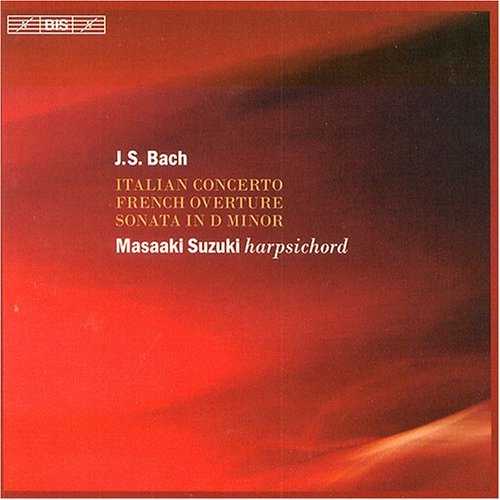
Performer: Masaaki Suzuki
Composer: Johann Sebastian Bach
Audio CD
Number of Discs: 1
Format: FLAC (image+cue)
Label: Bis
Size: 480 MB
Recovery: +3%
Scan: yes
01. Italian Concerto, for solo keyboard in F major (Clavier-Übung II/1), BWV 971 (BC L7): I. [Allegro]
02. Italian Concerto, for solo keyboard in F major (Clavier-Übung II/1), BWV 971 (BC L7): II. Andante
03. Italian Concerto, for solo keyboard in F major (Clavier-Übung II/1), BWV 971 (BC L7): III. Presto
04. Overture in the French Manner, partita for keyboard in B minor (Clavier-Übung II/2), BWV 831: I. Ouverture
05. Overture in the French Manner, partita for keyboard in B minor (Clavier-Übung II/2), BWV 831: II. Courante
06. Overture in the French Manner, partita for keyboard in B minor (Clavier-Übung II/2), BWV 831: III. Gavotte I & II
07. Overture in the French Manner, partita for keyboard in B minor (Clavier-Übung II/2), BWV 831: IV. Passepied I & II
08. Overture in the French Manner, partita for keyboard in B minor (Clavier-Übung II/2), BWV 831: V. Sarabande
09. Overture in the French Manner, partita for keyboard in B minor (Clavier-Übung II/2), BWV 831: VI. Bourrée I & II
10. Overture in the French Manner, partita for keyboard in B minor (Clavier-Übung II/2), BWV 831: VII. Gigue
11. Overture in the French Manner, partita for keyboard in B minor (Clavier-Übung II/2), BWV 831: VIII. Echo
12. Sonata arranged for keyboard in D minor (after BWV 1003, possibly by J.G. Müthel), BWV 964 (BC L184): I. [Adagio]
13. Sonata arranged for keyboard in D minor (after BWV 1003, possibly by J.G. Müthel), BWV 964 (BC L184): II. Allegro
14. Sonata arranged for keyboard in D minor (after BWV 1003, possibly by J.G. Müthel), BWV 964 (BC L184): III. Andante
15. Sonata arranged for keyboard in D minor (after BWV 1003, possibly by J.G. Müthel), BWV 964 (BC L184): IV. Allegro
Equal ultimacy of the One and the Many
I am still in the process of digesting this CD. I have listened to it twice, and since I’m not particularly well educated musically, it will probably take me many more listenings to understand some of the salient features of this performance. I have five or six recordings of just about all the pieces on this CD, played on harpsichord or piano, and although I can — or perhaps now that I have heard this disc I should change that to the past tense “could” — enjoy listening to any of them, none of them give the profound satisfaction that this recording does.
The sound of the harpsichord (a copy of an expanded Ruckers double keyboard instrument) is wonderful, and there is nothing to complain about with the recording, so a few quick observations about Suzuki’s performance. Perhaps Suzuki’s playing is best described as “expository.” If you want playing that helps you to *understand* these pieces, I think it would be hard to top Suzuki’s playing here. He seems to play every single note with more care and control than I have encountered in any other recording. And the “big picture” comes through very clearly as well. So what you have in this playing is an equal emphasis on “the One” (the big picture) and “the Many” (each tiny part) — something which strikes me as essential to presenting Bach’s music at its best. (That may be true of music in general, but I think it is particularly true of Bach.) Another thing, lest anyone suspect that here we have playing that is precisely perfect yet devoid of passion, rest assured that this is anything but “sewing machine music.” As part of his expository playing, Suzuki makes judicious, unobtrusive use of syncopation and other techniques to convey a sense of various emotions — especially jocundity — without any loss of a sense of dignity or “gravitas.” I’m sure others will be able to comment on aspects of these pieces that I have yet to take note of, but in the meantime I recommend this CD very highly.